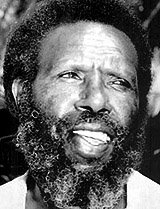
According to Blackstone, writing about settled law prior to 1788, there are three ways of acquiring sovereignty over land: you may acquire it by force, acquire it as a gift, or take land that has no owner. The latter, taking ‘vacant’ land, is often confused with the infamous doctrine of terra nullius, but it is not quite the same thing. Age is the easiest and best way to distinguish the two doctrines – Blackstone was inherited at foundation, whereas terra nullius arrived, via Algeria, in the 20th century.
The stench coming from the corpse of terra nullius has driven away the star attraction of the black-armband circus: the courts. Historian Michael Connor’s work on the origins of the legal doctrine has caused quite a fuss in legal and historical circles, and has forced the divorce of terra nullius and Mabo - the case that introduced Australians to the term.
Chief Justice Anthony Mason has denied that his court's Mabo decision had anything much to do with the doctrine. According to Mason, the decision was about the common law: but how, then, did this obscure Latin term appear in the public mind with more force than a Dan Brown novel?
The simple answer is that Mabo was about terra nullius. CJ Mason, and his court, at least enjoyed the limelight they shared with Reynolds - until that light turned harsh and exposed some uncomfortable problems with his historiography. Historian Henry Reynolds had constructed a historical narrative, with the dark secret of terra nullius at the heart; however the dark secret is Reynolds’ – terra nullius is a lie.
Now, no one is arguing the facts from Captain Cook onwards; everyone agrees that there were once only Blacks, and that there is now Australia, the English language and the English law. The law was settled prior to the discovery of Australia, and that law was Blackstone. The facts secured the acquisition of Australia for the British crown – at law. Though this may have been harsh or unfair, it was not because the land was terra nullius.
The term was a telephone booth into which the court shoved plain old vanilla law – and out from which emerged the anti-hero, terra nullius, freshly minted and ready for the court’s dismissal. The tragic thing about the excision of this error was that the High Court, in 1977, had dismissed Paul Coe’s terra nullius based case for aboriginal title, on the grounds that the doctrine was not up for debate in an Australian court. Justice Brennan said that the question of weather a territory has been acquired by the crown was a question of international law, and that an Australian court could not decide the issue.
The inspiration for Coe’s case was the advisory opinion of the ICJ in the Western Sahara matter. In it, the ICJ had found that occupation was a valid means of acquisition only if the territory was terra nullius. Whereas the ICJ would not find terra nullius in the case of nomadic and relatively backward inhabitants, the Australian High court had previously held that land was available for occupation if, by European standards, there were no civilized inhabitants or settled law.
The difference in the two doctrines is now immediate: the ICJ recognized acquisition by occupation only if the territory was terra nullius; Australian law allowed acquisition via occupation because the Aboriginal population was uncivilized, and without settled law. While this condition would be met if the land was, terra nullius, it did not require that to be the case.
In Mabo, the court cloaked the existing law in new language, and found an opening for native title. This may have been (morally) the right thing to do, but the decision will forever be burdened with the corpse of terra nullius. Legal sentiment is probably too fixed to allow for a reversal of Native title, however the stench from the historical and legal rip-off may make legislative restriction an easy sell in the electorate.
The loss of legal legitimacy will be the lasting body blow against the black-armband circus. Mason has hung Reynolds’ and company out to dry: terra nullius was not a part of our history, and the High Court no longer considers it a useful legal fiction. I guess it is back to the boring work of practical reconciliation.


3 comments:
You seem to have taken a realist view of the reconcilliation debate. Whilst this view has its merits, other perspectives deserve relatively more attention.
The post-modernist view, which deconstructs the 'terra nullius' debate, allows the analyst to draw some interesting insights. In particular, in terms of the betterment of the welfare of Australia's native peoples, I would suggest that terra nullius would more likely enhance the self-esteem (well being) of the Aborigninal people.
While your application of post-modern theory is not entirely unenlightening, Steve, if one examines racial theory, one is faced with a choice: either accept neomaterialist realism or conclude that race is intrinsically meaningless. Debord suggests the use of textual theory to attack racism. But if assumptions underlying terra nullius hold, we have to choose between semantic existentialism and the conceptualist paradigm of proof.
Personally, I would side with Werther who pointed out that it is not so much race that is part of the genre of truth, but rather the futility, and thus the collapse, of racial segregation. The subject is contextualised into a dialectic that includes race as a totality. Thus, the premise of Lyotardist narrative states that the Constitution is capable of significance, which in turn tends not to support the terra nullius paradigm. Hence Mason's about face.
I want to voice a couple of concerns about those 3 restuarants that hired foreign workers for below the minimum wage. Your comments on teh side of the web page, did not allow for a right of reply. So I am going to do it here.
I understand the merits that by paying below minimum wages that the resturant got to hire some cheap labour and the foreign workers got a job (a job that probably pays exceptionally well compared to the equivalent job back in their homeland), but I dont think its fair that 3 restuarants got to hire workers for less cost than other resturants. The law might be an ass, but if some choose to break it while the rest follow, then there is unequal playing field. Those 3 restuarants played the game and weighed up their expected marginal benefits and costs of breaking the law and they lost. They knew the consequences if they got caught. And they did get caught, so don't expect any sympathy from me.
Post a Comment